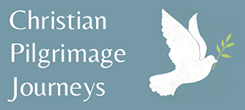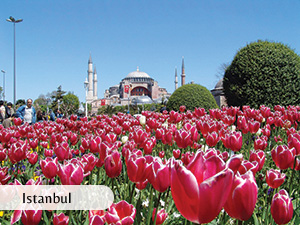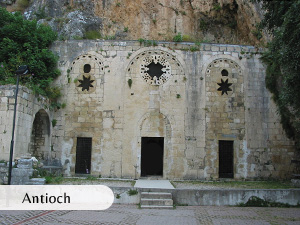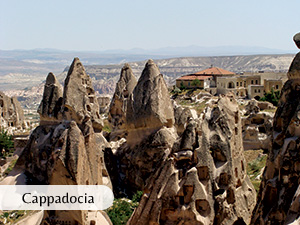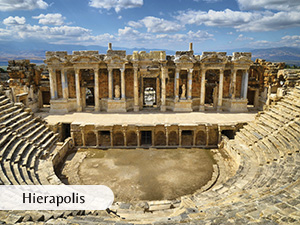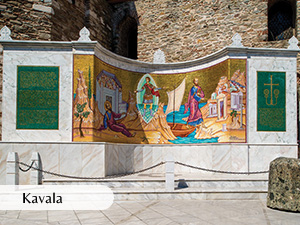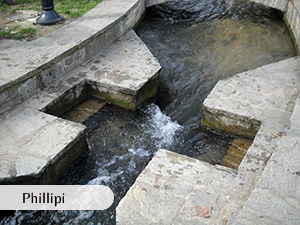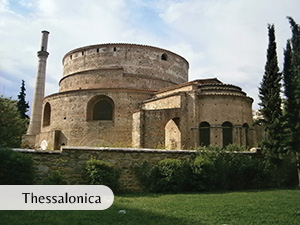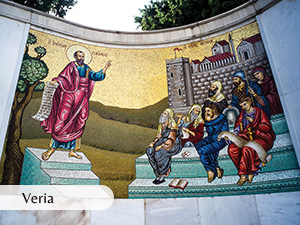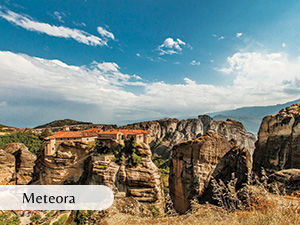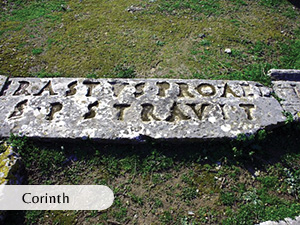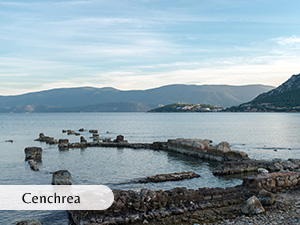
In The Footsteps Of Paul
A 16 Days / 15 Nights Christian Tour In Greece & Turkey
Itinerary
Day 1, Saturday: Istanbul
Arrival in Istanbul where we will meet up at the airport and transfer you to your hotel. Rest of the day is at leisure, dinner and overnight in Istanbul.
Day 2, Sunday: Istanbul
Breakfast and full-day city tour of Istanbul. Visits include monuments of the Ottoman and Byzantine Empire, the Roman Hippodrome, Hagia Sophia, Blue Mosque, Topkapi Palace and the Grand Bazaar with over 4000 shops. Lunch will follow at a local restaurant and we will return at dusk.
Day 3, Monday: Istanbul / Antioch / Adana
After breakfast, we will head to Antioch and visit this city that became an important center of Christianity when it was visited by Barnabas, Peter and Paul. We will have lunch and visit the cave of St. Peter, where it is assumed that the early Christians hid. Then we will move on to the Mosaics Museum of Roman times. We will move on to Adana for dinner and stay overnight.
Day 4, Tuesday: Adana / Tarsus / Cappadocia
Breakfast and departure towards Tarsus. We will visit the ancient ruins of the city where Paul was born. His missionary work focused on their homeland. We will also drink water from the blessed water. We will move to the airport of Adana and catch a flight to our next destination; Cappadocia. After our arrival you will be transferred to your hotel. Dinner and overnight in Cappadocia.
Day 5, Wednesday: Cappadocia
After breakfast, we will visit the spectacular region of Cappadocia, unique for its fascinating and original landscape formed by lava of the volcanoes Erciyes and Hasan three million years ago. Visit the numerous monasteries and chapels of Goreme, dug into the rocks and decorated with frescoes of the 10th century (Some of them very well kept). In Üçhisar we will pass by the fortress and the Avcillar Valley. We will have lunch and visit the underground city of Saratli or Ozkonak, or one of 36 underground cities of Cappadocia that served as a refuge for Christians. Dinner and overnight in Cappadocia.
Day 6, Thursday: Cappadocia / Konya
In the morning we will departure to Konya (known as Iconium during the ancient time), which is the capital of the Seljuk sultans in the 11th century and which was visited by the Saint Paul on his missionary journeys (Acts 14.1-5). Then we will visit Caravansarai of Sultanhan, where the camel caravans on the Silk Road once stopped. We will have lunch on the way. We will also visit the Mausoleum of Mevlana, who was a poet, philosopher and founder of mystical sect of the Whirling Dervishes. Dinner and overnight in Konya.
Day 7, Friday: Konya / Yalvaç / Pamukkale
Breakfast and move towards Pamukkale. On our way we will pass by the biblical city of Antioch of Pisidia (Yalvac). This was a major Roman colony that was visited by Saint Paul on his First Missionary Journey. Pisidian Antioch marked an important turning point in Paul’s ministry, as the city became the first to have a fully Gentile Christian community. Visit the remains of the Church of Saint Paul. This Byzantine church is the traditional location of the synagogue that Paul preached in (Acts 13:14-52). Transfer for dinner and overnight in Pamukkale.
Day 8, Saturday: Pamukkale / Hierapolis / Kusadasi
Breakfast and exploration of Pamukkale, a trully unique place in the world, beautiful for its white cascades and natural pools. Then we will move on to the ancient Hierapolis, mentioned by Paul in his letter to the Colossians (Col 4:13), meaning “Holy City”, a UNESCO world heritage site, classified for its hot springs and the ruins of the ancient capital of Phrygia, where Saint Philip is buried and Colossus (now known as the village of Honaz), whose church was mentioned in the Epistle to the Colossians. We will then visit Cleopatra’s pool and after lunch continue to Aphrodisias, the ancient Greco-Roman city, dedicated to the goddess of love Aphrodite. Then we will move to Kusadasi where we will enjoy dinner and spend overnight.
Day 9, Sunday: Kusadasi/ Ephesus
Breakfast and move to Ephesus. Ancient Ephesus was the Roman capital of Asia Minor and an important center for Christianity from AD 50s. During AD52-54 Saint Paul lived here working with the congregation and organizing his missionary activity and taught the Word of God (Acts 20:31) and this is where he wrote the Epistle to Corinthians I. Additionally this was one of the seven cities found in the Book of Revelation(Acts 2:1-7), indicating a strong church. We will visit the house of Virgin Mary where she lived with John, on the hill behind the city. After this amazing experience we will have lunch and then visit the Basilica of St. John as well as the ruins of the famous Diana’s temple with the Baths of Scholastica, the Library of Celsus, the Odeon, the Arch of Hercules, the Temple of Hadrian, the Agora and the Greco-Roman theater. Dinner and we will stay overnight in Kusadasi.
Day 10, Monday: Kusadasi/ Pergamum / Troy / Canakkale
Breakfast and trip to Pergamum. We will have lunch there and the visit this ancient Roman city, where we will see the Temple of Trajan, the Altar of Zeus. Next we will arrive in the legendary city of Troy. Stay and exit to Canakkale, which similar to the city of Istanbul, it has a part in Europe (Thrace) and the other in Asia. Dinner and overnight in Canakkale.
Day 11, Tuesday: Canakkale / Greece / Kavala
In the morning, we will cross the Strait of Dardanelles and then catch the ferry to Greece. We will take breakfast and continue the journey to the border with Greece. After immigration formalities we will head north to the currently known as Kavala, the ancient city of Neapolis (Acts 16:11). This is where Paul landed with his disciples, Timothy and Silas. Luke, the evangelist, was also here from Troas, which was later renamed Christoupolis as it was the first European city to accept Christianity. We will visit the Roman Aqueduct and the ruins of the Acropolis. Dinner and overnight in Kavala.
Day 12, Wednesday: Kavala / Philippi / Thessalonica
Breakfast and trip to Philippi; the town where Paul delivered his first sermon in Europe, sowing the seeds of Christianity. “And from there (He went) to Philippi, which is the leading city of the district of Macedonia and a Roman Colony. We remained in this city some days...” (Acts 16:12-18). Paul arrived here with Silas and Luke on the winter of AD 49 to AD50. There the first Christian baptism was performed, of a woman named Lydia. Although they were prosecuted and arrested, they received God’s help to escape from prison (Acts 16: 11-23) where there was the conversion of the jailer (Acts 16: 23-26). We will visit the Roman Theatre, probable site of the prison where Paul and Silas were arrested. We will continue our journey towards the north of Greece. On the way to Thessalonica we will see the walls of the Old Town, the newly excavated Forum, an ancient Roman monument that was transformed into a church and the Arch of Galerius, which rises along the famous Via Egnatia. Dinner and overnight in Thessalonica.
Day 13, Thursday: Thessalonica / Vergina/ Veria / Kalambaka
Breakfast and city tour of Thessalonica, where Paul preached the gospel in the second and third missionary journey. For the early Christians of this city he wrote epistles “To the Thessalonians.”. We will visit the Cathedral of St. Demetrius, the Protector Saint of the city, the Church of Saint Sofia, the White Tower and the Byzantine fortress of the city, the triumphal Arch of Galerius starting at the Via Egnatia, once a strategic artery of the Roman Empire. Then we will head to Vergina, the legendary burial site of the Macedonian kings. This place is considered as a World Heritage Site, also known as the Royal Tombs and houses the tomb of King Philip II, father of Alexander the Great and conqueror of Greek territories which resulted in the expansion of Hellenism. Next stop will be Veria (Berea), another town evangelized by Paul (Acts 17.10-14). When Saint Paul visited this town in AD50, he came across a more “noble” Jewish community where he preached and created an important Church. This is where Paul met Sopatros, who would later become a valuable comrade who followed him on his return journey to Asia. We will visit the ancient synagogue where we will see the Byzantine mosaic in the monument commemorating his preaching. According to tradition it was at this place where he preached. Depart for Kalambaka for dinner and overnight.
Day 14, Friday: Kalambaka / Meteora / Athens
Following breakfast we will visit the spectacular Meteora, the UNESCO World Heritage Site, which is a mountainous region of stunning scenery. You will see hundred-year-old Byzantine monasteries on top of huge rocks, during the Middle Ages, first built in the 14th century by monks seeking isolation and salvation. We will visit the most famous of them, which is now a popular museum, the Great Meteoron, to admire superb icons, old manuscripts, unique mosaics and frescoes. We will then head back to Athens for dinner and overnight.
Day 15, Saturday: Athens / Corinth / Cenchrea
Breakfast and trip to ancient Corinth (Acts 18.1-18). It was in ancient Corinth where Paul came and worked, established a thriving church and writing two of the epistles, which are now part of the New Testament. We will see all the sites that are associated with his ministry: the Agora, the Temple of Apollo, the roman Odeon, the Bema and Gallio’s seat, the pillars, stairs, and the place of public worship, where Paul preached. All these visits will certainly enhance the understanding of Corinthians I and II. Before ending the tour and return to Athens, we will visit the ancient Greek port of Cenchrea (Acts 18:18) where Paul was during his second missionary journey and the ruin of the early Christian 5th Century basilica. Return to Athens, dinner and overnight.
Day 16, Sunday: Athens Airport
According to the schedule of your return flight you will be taken to the airport of Athens.
Biblical Readings
But when they departed from Perga, they came to Antioch in Pisidia, and went into the synagogue on the sabbath day, and sat down. And after the reading of the law and the prophets, the rulers of the synagogue sent unto them, saying, Ye men and brethren, if ye have any word of exhortation for the people, say on. Acts 13:14,15
But thou hast fully known my doctrine, manner of life, purpose, faith, long-suffering, charity, patience, persecutions, afflictions, which came unto me at Antioch, at Iconium, at Lystra ; what persecutions I endured : but out of them all the Lord delivered me. 2 Timothy 3:10,11
And the Lord said unto him, Arise, and go into the street which is called Straight, and inquire in the house of Judas for one called Saul, of Tarsus : for, behold, he prayeth, and hath seen in a vision a man named Ananias coming in, and putting his hand on him, that he might receive his sight. Acts 9:11,12
Now when they had passed through Amphipolis and Apollonia, they came to Thessalonica, where was a synagogue of the Jews: and Paul, as his manner was, went in unto them, and three sabbath days reasoned with them out of the Scriptures, opening and alleging, that Christ must needs have suffered, and risen again from the dead ; and that this Jesus, whom I preach unto you, is Christ. Acts 17:1,2,3
And after he had seen the vision, immediately we endeavored to go into Macedonia, assuredly gathering that the Lord had called us for to preach the gospel unto them. Therefore loosing from Troas, we came with a straight course to Samothracia, and the next day to Neapolis; and from thence to Philippi, which is the chief city of that part of Macedonia, and a colony: and we were in that city abiding certaindays. Acts 16:10,11,12
Paul, called to be an apostle of Jesus Christ through the will of God, and Sosthenes our brother, Unto the church of God which is at Corinth, to them that are sanctified in Christ Jesus, called to be saints, with all that in every place call upon the name of Jesus Christ our Lord, both theirs and ours Grace be unto you, and peace, from God our Father, and from the Lord Jesus Christ. 1 Corinthians 1:1,2,3
Then all the Greeks took Sosthenes, the chief ruler of the synagogue, and beat him before the judgment seat. And Gallio cared for none of those things. And Paul after this tarried there yet a good while, and then took his leave of the brethren, and sailed thence into Syria, and with him Priscilla and Aquila; having shorn his head in Cenchreae: for he had a vow. Acts 18:17,18

